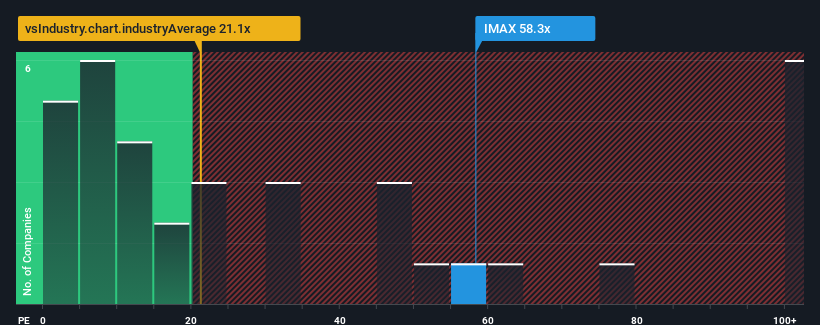IMAX Corporation (NYSE:IMAX) shares have had a really impressive month, gaining 25% after a shaky period beforehand. The last 30 days bring the annual gain to a very sharp 61%.
Since its price has surged higher, given close to half the companies in the United States have price-to-earnings ratios (or “P/E’s”) below 18x, you may consider IMAX as a stock to avoid entirely with its 58.3x P/E ratio. Although, it’s not wise to just take the P/E at face value as there may be an explanation why it’s so lofty.
Our free stock report includes 2 warning signs investors should be aware of before investing in IMAX. Read for free now.
IMAX hasn’t been tracking well recently as its declining earnings compare poorly to other companies, which have seen some growth on average. It might be that many expect the dour earnings performance to recover substantially, which has kept the P/E from collapsing. If not, then existing shareholders may be extremely nervous about the viability of the share price.
View our latest analysis for IMAX

Keen to find out how analysts think IMAX’s future stacks up against the industry? In that case, our free report is a great place to start.
What Are Growth Metrics Telling Us About The High P/E?
The only time you’d be truly comfortable seeing a P/E as steep as IMAX’s is when the company’s growth is on track to outshine the market decidedly.
Taking a look back first, the company’s earnings per share growth last year wasn’t something to get excited about as it posted a disappointing decline of 2.0%. At least EPS has managed not to go completely backwards from three years ago in aggregate, thanks to the earlier period of growth. Therefore, it’s fair to say that earnings growth has been inconsistent recently for the company.
Turning to the outlook, the next three years should generate growth of 29% each year as estimated by the eleven analysts watching the company. Meanwhile, the rest of the market is forecast to only expand by 10% per annum, which is noticeably less attractive.
In light of this, it’s understandable that IMAX’s P/E sits above the majority of other companies. It seems most investors are expecting this strong future growth and are willing to pay more for the stock.
The Key Takeaway
The strong share price surge has got IMAX’s P/E rushing to great heights as well. Generally, our preference is to limit the use of the price-to-earnings ratio to establishing what the market thinks about the overall health of a company.
We’ve established that IMAX maintains its high P/E on the strength of its forecast growth being higher than the wider market, as expected. At this stage investors feel the potential for a deterioration in earnings isn’t great enough to justify a lower P/E ratio. It’s hard to see the share price falling strongly in the near future under these circumstances.
You should always think about risks. Case in point, we’ve spotted 2 warning signs for IMAX you should be aware of.
If P/E ratios interest you, you may wish to see this free collection of other companies with strong earnings growth and low P/E ratios.
If you’re looking to trade IMAX, open an account with the lowest-cost platform trusted by professionals, Interactive Brokers.
With clients in over 200 countries and territories, and access to 160 markets, IBKR lets you trade stocks, options, futures, forex, bonds and funds from a single integrated account.
Enjoy no hidden fees, no account minimums, and FX conversion rates as low as 0.03%, far better than what most brokers offer.
Sponsored Content
New: AI Stock Screener & Alerts
Our new AI Stock Screener scans the market every day to uncover opportunities.
• Dividend Powerhouses (3%+ Yield)
• Undervalued Small Caps with Insider Buying
• High growth Tech and AI Companies
Or build your own from over 50 metrics.
Have feedback on this article? Concerned about the content? Get in touch with us directly. Alternatively, email editorial-team (at) simplywallst.com.
This article by Simply Wall St is general in nature. We provide commentary based on historical data and analyst forecasts only using an unbiased methodology and our articles are not intended to be financial advice. It does not constitute a recommendation to buy or sell any stock, and does not take account of your objectives, or your financial situation. We aim to bring you long-term focused analysis driven by fundamental data. Note that our analysis may not factor in the latest price-sensitive company announcements or qualitative material. Simply Wall St has no position in any stocks mentioned.









